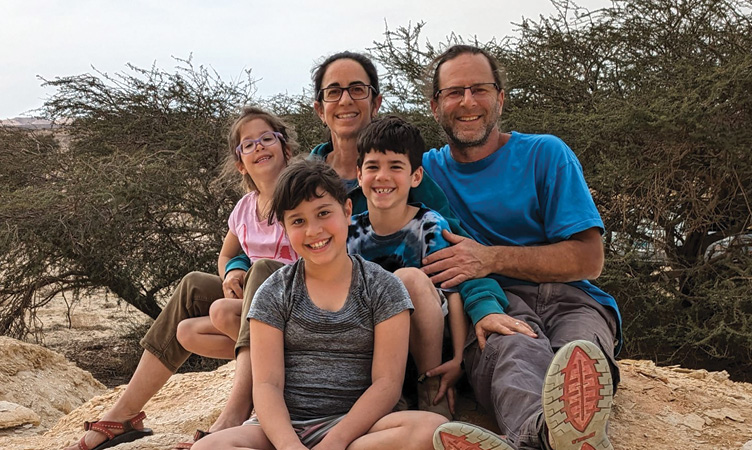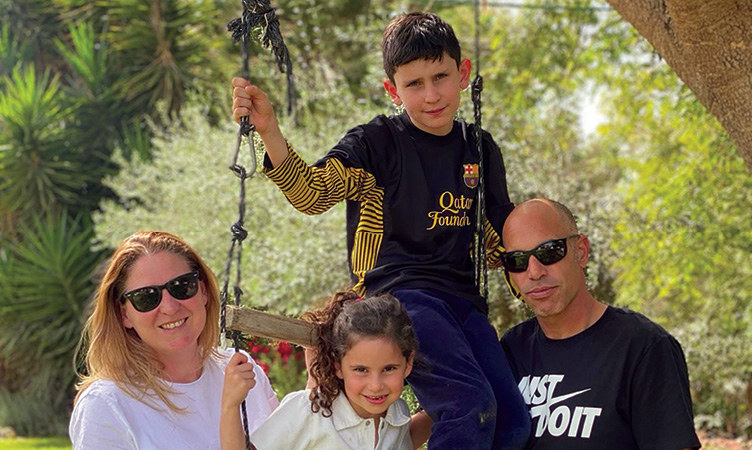The endless stretches of desert sands and the untouched, rugged beauty surrounding Kibbutz Yahel in Israel’s Arava region offer a striking juxtaposition to the bustling streets and vibrant pulse of Tel Aviv. But for the Roth-Ganor family, after 20 years in Tel Aviv, a move to the kibbutz made absolute sense.
Until last summer, Tel Aviv was home for Alexandra Roth, a social activist, her psychiatrist partner, Dr. Uri Ganor, and their two children. But keen to make a greater impact, the couple investigated relocating to the south temporarily—albeit a region lacking in some services and amenities.
“Our life was good in Tel Aviv,” stressed Alexandra. “Our family and friends are there. Culturally, socially, Tel Aviv was good for us. But, we wanted to do more for our nation.”
They explored the area in March 2023, using proximity to Eilat as their anchor, where Uri would work, and Alexandra would further her studies in social work at the University of Ben Gurion campus.
Why Kibbutz Yahel?
“We stumbled on Kibbutz Yahel by chance,” said Alexandra. “There were serious storms on the day we were in the area, and the road was suddenly closed ahead of us. We turned into the nearest kibbutz, which happened to be Yahel, and the people were incredible. It just so happened that one of them was a doctor who was in the army with Uri. Things just progressed naturally from there.”
Founded in the 1970s, Kibbutz Yahel was built around the principles of religious pluralism and tolerance; Jewish National Fund-USA chose the kibbutz to be the pilot for its Housing Development Fund. Thanks to the generosity of its donors, including the Crown Family Foundation, Jewish National Fund-USA built housing there as part of its greater Blueprint Negev campaign to help move population down south away from the country’s over-crowded center. The availability of housing and integration into an established community of like-minded people clinched the deal for the Roth-Ganors.
October 7 Was the True Test
The couple had moved to the region to make a difference and to be part of a generation of 21st century Zionist pioneers; when the events of October 7 unfolded, they immediately rose to face challenges that no one could have seen coming. By the next day, as traumatized communities from the Israel Envelope sought refuge in Eilat’s hotels, Uri established a situation room in the city and promptly assigned professionals to assist them. This immediate care greatly aided in their healing process. Meanwhile, Alexandra created a safe haven for evacuated families on the kibbutz, providing emotional support and practical assistance with paperwork and childcare. It was also the catalyst for them to decide to stay on the kibbutz and make it their permanent home.
"We saw how wonderful the community is,” she said.
Alexandra acknowledges that there are some challenges to living in a remote region. “I can’t just pop over to the corner store,” she admits. “Everything needs preplanning.”
But the advantages far outweigh the challenges. Their children are thriving in schools of the highest quality, they are more independent, and life on the kibbutz is “great for family life.”
“Tel Aviv was good,” she said. “But this is a different kind of good. This is home.”
The Desert is Our Happy Place
Whenever they wanted a break, Dana—the daughter of olim (immigrants from the US)—and Yaniv Munwes, along with their three children, headed to their happy place: the Arava. They loved the biblical landscapes of the desert, the quiet and the peace surrounding them. Paran, a moshav (co-op community) in southern Israel, became their second home, where they spent quality time in a friend’s bed and breakfast. The idea of permanently relocating to the Arava crossed their minds occasionally, but Dana’s role as a family physician and their children’s ties to the local school system they attended presented obstacles.
The Universe Wanted Us to Move
The turning point came with October 7.
“The war opened a new chapter in our lives,” said Dana. On October 8, with the children’s school closed, they packed their car and headed to Paran, where they remained for weeks, living amid the supportive community and witnessing how the moshav embraced evacuees even as its population temporarily doubled. As they prepared to return home, a realization struck Dana and Yaniv: Why not make Paran their permanent home?
Before committing, they explored other communities in the region, acknowledging the challenges of Paran’s remoteness—at 60 miles from Eilat, it is the southernmost moshav in the Arava, distant from other settlements and amenities. Yet, the sense of community and camaraderie in Paran won them over.
“The universe wanted us to move,” said Dana “With all the chaos in the country, somehow, it all fit into place for us.”
They officially became members, settling into their new home on April 1. Dana joined the Arava’s medical team and loves her job, while Yaniv continued in the field of agricultural innovation. “The Arava is great for him,” she reflected. “The area calls for more creativity and innovation in agriculture. It’s hugely satisfying.”
Their children now commute to the excellent local school by bus, with extracurricular activities conveniently located on campus. The regional council’s bus service ensures their safe return home, while supermarket deliveries have become a convenient norm since the pandemic.
“Even though we’re far from everything, we have everything we need right here,” said Dana.
She reflected on their newfound life, emphasizing the unparalleled quality of life and sense of belonging in Paran. “We feel that our lives have been upgraded significantly,” she said. “We feel at peace here.”
This Is Our Home
Sde Nitzan, located 2 hours south of Tel Aviv in the Eshkol Regional Council has always been Talya Kuzi’s home. The moshav, a region that borders Gaza, founded by immigrants from English-speaking countries including her South African parents, is where she and her husband, Shani, chose to raise the children, Gal and Zohar. Her father has passed away, but her mother, Cynthia Field, remains an active member of the moshav. Even in her eighth decade, she still works in the factory office.
The family had just returned from a two-week vacation in South Africa on October 6, unaware that their lives would change drastically in less than 24 hours. On Saturday morning, they awoke to relentless rocket fire and spent hours in their safe rooms, horrified by the sounds of gunshots and heavy artillery from nearby communities.
The next day, the Kuzis, along with the rest of the moshav, were evacuated to hotels in Eilat, their vacation bags still packed.
The Decision to Return
After six weeks, Shani returned to Sde Nitzan to keep his job, commuting three hours to Eilat every weekend to be with his family. “It was an extremely difficult situation,” Talya said. “He felt disconnected, not being part of our daily routine. The children would cry when he left for the week. Our family was torn apart.”
The breaking point came when Talya fell ill with a virus and needed her husband’s support. Unable to walk without assistance she realized their family needed to be together. Alone in the hotel room with her children, she decided, after four months, it was time to return home.
Inspired by the Older Generation
It wasn’t an easy decision. They were among the first families to return, finding no children for theirs to play with and no community life. It helped that their children were willing to return, keen to be near their father again.
“It also helped us immensely that the older generation, including my mother, chose to stay on the moshav during the evacuation,” Talya said. “It gave us strength and a sense of security. They helped us believe we had a future here.”
The return of the Kuzi family inspired several others to come back, although the community has not fully returned to its pre-October 7 state. Talya believes that many families chose to finish out the school year where they are, hoping more will return during the summer. Meanwhile, her children attend the regional school set up in Kibbutz Gvulot with the help of Jewish National Fund-USA and have made friends outside their community.
“It’s not perfect right now, but Eshkol is home,” Talya declared. “Sde Nitzan is my home. Where else would I go? This is where I’ve made my home. This is where we have chosen to live as a family. I believe that this is where our future lies.”



